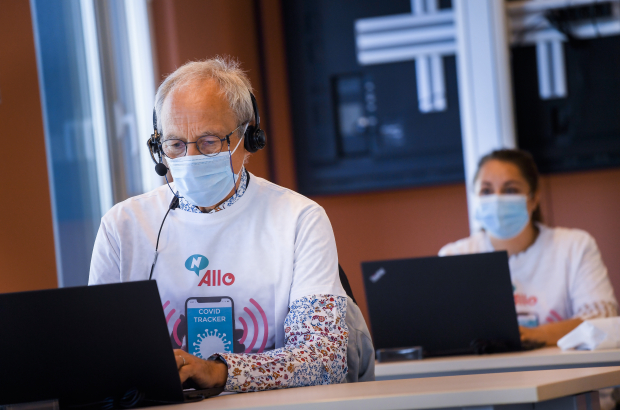- Daily & Weekly newsletters
- Buy & download The Bulletin
- Comment on our articles
Coronavirus: How does Belgium's contact tracing operation work?
Belgium's contact-tracing operation is currently made up of 1,700 people working in call centres and further 300 field staff who try to reach people who do not answer the phone. The call centres make 1,500 phone calls per day, with a 92% success rate. Meanwhile, more than 2.3 million people have so far downloaded the Coronalert app. Since 30 September, the app has registered 131,000 coronavirus test results. Some 22,000 people tested positive - of whom 11,000 used the app to send an alert to people with whom they have come into close contact.
The contact tracing operation is regionalised. Most of the tracers work in a call centre, but some are field workers whose job is to visit people who cannot be reached by phone. The significant increase in the number of coronavirus infections in Brussels is putting pressure on the region's contact-tracing effort. It's a similar picture in Wallonia, where call centre workers had to contact 2,734 people on Monday alone, and only managed to reach 1,026 of them. In Brussels, 60% of calls were successful on Sunday and 53% on Monday. Both regions are urgently recruiting extra staff to cope with the increased workload.
For Belgium's contact tracing efforts to be effective, each of us needs to start noting down our daily contacts. "Make it a habit to take note of the people with whom you have close contact," wrote virologist Emmanuel André on Twitter. "That way, in case you get sick, these people will be able to receive support."
If the contact tracing hotline makes contact with you, because you have been in contact with an infected person, you should keep an eye out for potential symptoms and limit your contacts to the bare minimum.
Since their work officially began on 11 May, Belgium's contact tracers have managed to get in touch by telephone with about 60% of people who have recently tested positive for coronavirus. "On average, each person gave us the details of two other people that they had been in contact with. This proves that the self-isolation measures are being correctly applied," a spokesman said.
However, Belgium's federal crisis centre fears that some of the people who are called by the contact tracers, because they have tested positive for the virus, are not being 100% honest about who else they have been in contact with.
Between 400 and 500 people are contacted every day by the call centres. Most of them claim they have been in close contact with one or two other people, "which is very low", interfederal spokesman Yves Van Laethem said.
People are still not telling the truth to contact-tracers about who they have been in close contact with, according to Axel Legay, who is in charge of launching Belgium's contact-tracing app. The social bubble rule means "people are afraid to tell the truth", he says. "For example, if they have seen 20 people, they will give just five names. If the other 15 people fall ill, we will eventually find out, but maybe too late and they will have already infected other people." He says the app will also avoid people being told to self-isolate needlessly. "At a show outdoors, with 400 people, if we take the names of people without really knowing if they came into contact with each other, we will tell too many people to quarantine. Thanks to the application, we will be able to refine these results."
The Coronalert contact-tracing app has been downloaded more than two million times, which means roughly a third of smartphone users in Belgium are now using it.
Consumer rights organisation Test-Achats has given its blessing to the new app, which alerts users if someone they have come into close contact with has tested positive for the coronavirus. It can also track if a user has been to a red zone and then warn other users if they are closer than 1.5 metres to that person. According to Test-Achats, the app is unable to identify the user. “The app doesn’t know who you are, where you are or who you have seen,” said the organisation in a statement. “It works only with codes. The exchange of data between the app and the servers is encrypted and the servers are fully protected against hacking. In terms of privacy, it couldn’t be much better.”
Karine Moykens, who is in charge of the interfederal "test and trace" task force, said Belgium's contact-tracing effort was becoming more efficient. "We have really improved the speed between the moment the data is sent by Sciensano to the contact centre and the moment when people are actually contacted," she said in an interview. "85% of those infected are reached within 24 hours of receiving the information. But all is not perfect. We had to solve problems at different stages." Incomplete or incorrect data slows down the contact-tracing work: "The quality of the information is not always good. Some results do not have the correct date or national register number. It is then impossible to recognise the patient from Sciensano's side. We end up with positive tests without knowing who they correspond to. We cannot therefore trace them." All "high-risk contacts" who have been in close contact with an infected person should receive a QR code entitling them automatically to a coronavirus test without the need for a doctor's prescription.
Finally, a word of warning: scam text messages are being sent out, claiming to be from Belgium's official contact tracing centres. The messages say you have been in contact with someone who has tested positive - and that you should click the link to find out more. Official contact from the contact tracers will come from the phone number 02 214 19 19, or by text message from the number 8811.
Photo: Laurie Dieffembacq/Belga














